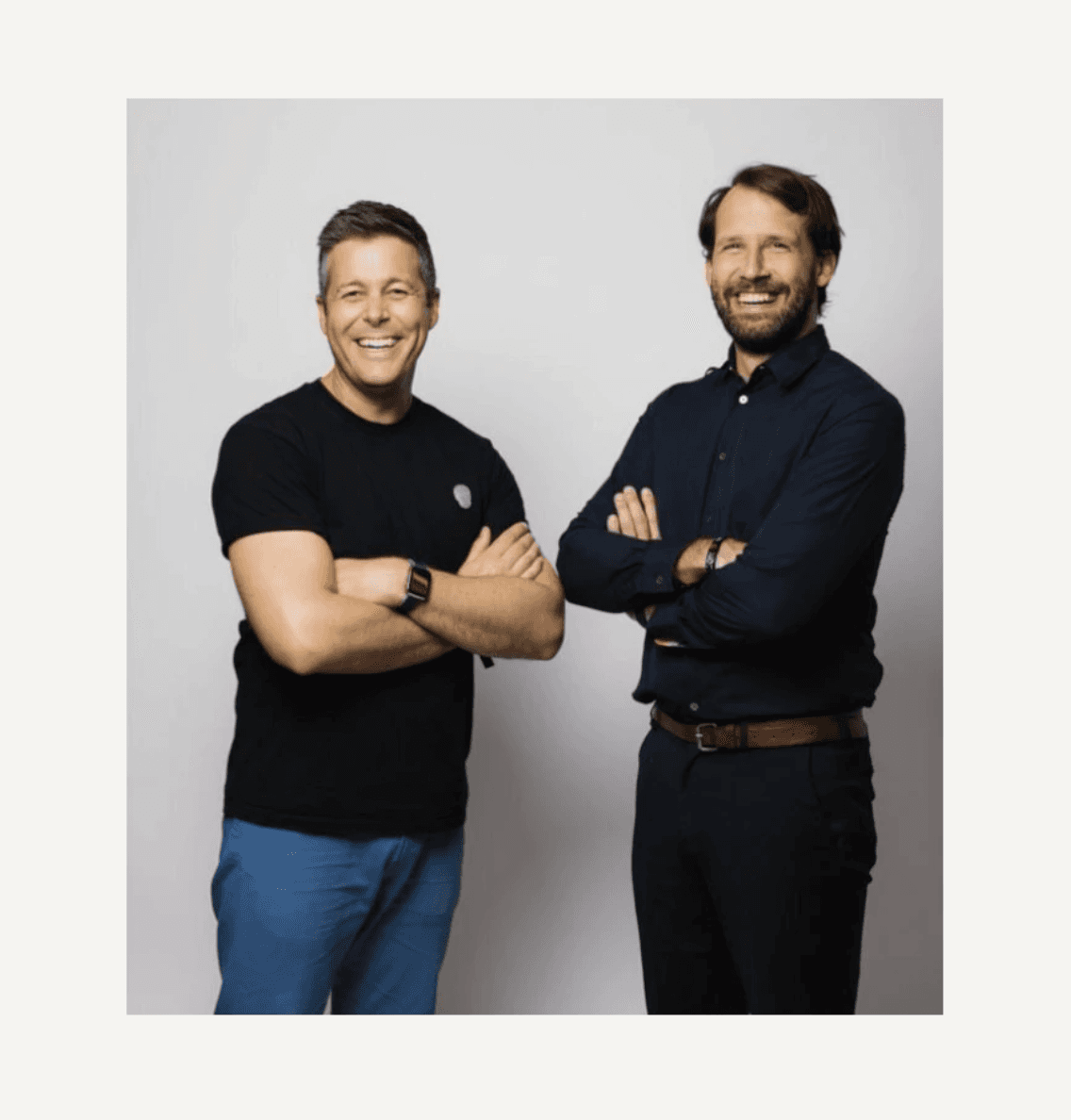Feb 25, 2025
5min read

Authors
EQT Ventures
How Malte Kosub and Stefan Ostwald turned software as a service into service as software
— -
Parloa, co-founded by CEO Malte Kosub and CPO Stefan Ostwald, is on a mission to revolutionise how businesses interact with their customers using advanced agentic AI technology for customer service.
But like many businesses, their mission began with a more prosaic moment: a shared vision sparked from a chance meeting at a conference in Berlin back in 2016. It was an intriguing time for tech, and has been cited as the year that AI came of age. Companies began integrating true AI-powered components into their apps and services, including Google’s first smart home device, Google Home. And Stefan was obsessed with what could come from that revolution.
Malte had previously founded and sold an e-commerce startup before starting Parloa. It was there that he gained first-hand insight into the challenges of delivering exceptional customer service, immersing himself in the roles of the customer, agent, and company.
Through his conversations with customers, he discovered their frustrations with the current state of customer service and how even minor improvements were hugely appreciated compared to “normal” customer service experiences. Then, taking on the role of a traditional agent and answering calls himself, he realised that the repetitive nature of the work made it tough to consistently maintain high service standards and good spirits, even for the most optimistic of agents.
As the company grew, he also experienced how difficult it was to scale customer support operations while continuing to deliver best-in-class experiences. All of this made Malte realise: customer support is not a cost centre, but a business opportunity waiting to be seized.
Stefan and Malte’s past experiences led to an immediate mutual understanding when they met. Stefan’s passion for the emerging era of human-machine communication fueled Malte’s enthusiasm. “The plan was as simple as it was ingenious: to immerse ourselves in the topic as quickly as possible and build up expert knowledge that would be sold as an agency service in order to identify real problems with the customers acquired,” explains Malte.
That agency service would become their business: Future of Voice. It came into being alongside the rise of AI and voice technology. Many enterprise customers needed support entering this new era of customer communication, and Malte and Stefan wanted to cater to the enterprises’ needs. They were inspired to build their own product, Parloa: a scalable AI-driven SaaS platform to revolutionise customer service.
The decision to advise clients on the use of AI in customer communications quickly became a winning formula, and Future of Voice built a reputation as an agency, advising major clients such as Red Bull, Vodafone, and Deutsche Bahn, while also selling Parloa.
The feedback from agency clients on Parloa, alongside the profits, helped make Parloa’s early success possible. The platform kept on growing with support from the agency, profits from which were ploughed into developing the new product. The time quickly came to sell the agency business and focus fully on expanding the Parloa platform as a SaaS offering. “When we split up the companies, we had 12 or 13 people on the product side, and probably 15 people in the agency,” says Malte.
It proved to be a prescient decision: in mid-2021 they won their biggest client yet, HSE, in a live, multi-vendor demonstration. The client was seeking a contact centre AI product with powerful phone capabilities and tested a number of competitors in real-time, ultimately deciding Parloa’s solution was superior. “It was a great feeling,” Malte reminisces.
That built confidence within the company that they had hit on the right product-market fit — and that their product was a cut above everything else out there at the time. In May 2022, Parloa raised a €4 million seed round, allowing them to build a commercial organisation with a sales playbook and scaled engineering and product teams, Malte explains.
Things moved quickly from there. Seeing growth, Parloa sought to raise more money for a Series A round — and they soon found an investor looking to support them in reaching their full potential.
It was early 2023, and Doreen Huber, partner at EQT Ventures, was introduced to Parloa.
“I remember I was sitting in my hotel room and saw the pitch deck,” she says. It immediately struck a chord. “Parloa will change customer care forever.” A few years back she was COO of Delivery Hero, the online food delivery company. And her responsibility was also customer care. She knew how capital-intensive human customer care was and how challenging it is to run these teams. And as a result, she recognised how Parloa could improve staffing levels, efficiency and importantly, customer satisfaction. This is a $400 billion industry.
“I wanted to talk to them immediately — like, today,” Doreen says. That was vital, because the funding round was already in progress, and Parloa’s founding team had already received offers.
In their first call Malte promised to pitch the idea of Parloa to EQT Ventures’ in 15 minutes, and hit the mark almost to the second. “I was sold,” says Huber. “I knew immediately that I wanted to do this deal.”
The EQT Ventures team flew to Berlin, met with Parloa and found a match on both a personal level and a professional level. Software investments have been a part of EQT Ventures’ DNA, and the team has a long history in backing enterprise software, with investments in companies including Anydesk, Sana Labs and Beamery.
EQT Ventures started the process and “There was a match, directly,” Malte says. “We had a very good feeling about them.” In March 2023, Parloa announced its €20 million Series A led by EQT Ventures, who were chosen because of their international reach, ability to support the company — and their passion and knowledge of the industry they were investing in. “First, we had the feeling they were as excited about the product as we are,” says Malte. “Second was the people themselves: we thought, ‘We want to work with them’. Third, I think the global network and the brand are great.”
“I believe Parloa can become a Salesforce,” says Doreen. “Salesforce is the dominant player in the CRM and sales platform market. Parloa has the potential to become the dominant player for the customer service market”. And EQT Ventures set about supporting them to become that size of company. “The EQT Ventures brand definitely helped us to recruit,” says Malte. But that was far from the only benefit of the partnership. “They challenged us in the way we work. But they also gave us a lot of freedom. ’”
That support, challenge and freedom has resulted in Parloa finalising a $66 Million Series B round. “The whole organisation will dramatically grow in the next 12 to 18 months,” says Malte.
The founding team has a lofty goal for Parloa. “We want to be the backbone for companies to communicate with their customers,” says Malte. “We believe in a world where every customer interaction can be as easy as talking to a friend. AI Agents for customer support will be the centrepiece of communication with customers and as a result, this AI agent management platform will be one of the most important pieces of software within a company. At the same time, job satisfaction for customer service agents is at an all time low: 71% of agents have considered quitting their job in the past 6 months. We enable customer support staff to go after more meaningful jobs. A win-win situation.”
That thought helps support a broader belief that Malte and Stefan have about the future of tech. “We don’t believe in software as a service anymore. We believe in service as software.” Rather than selling specialised products, the company aims to sell the full, end-to-end solution to clients. The company swapped those two words around because they believe they’re not only delivering software that makes agents 20% better, but software that can manage customer service requests as a default, minimising wait times, increasing customer satisfaction and freeing up human agents to function as a point of escalation.
“This is probably one of the biggest changes in software in history,” says Malte.




















































































































































